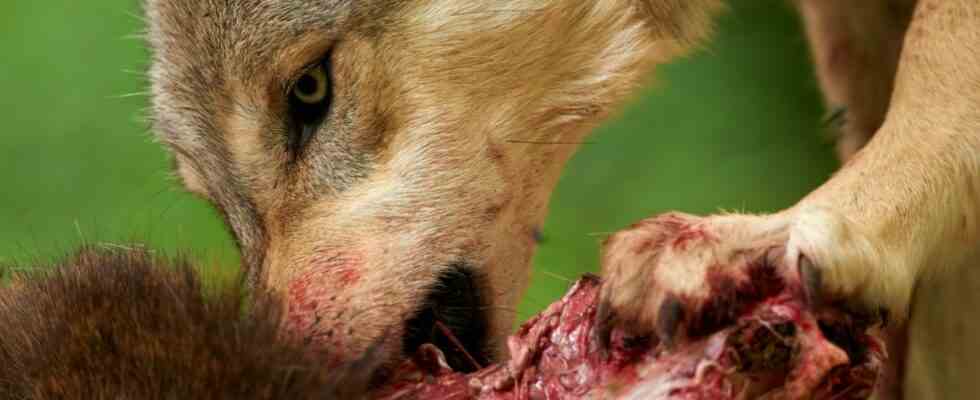It’s a start for Sepp Glatz. “Now it’s official that we can’t protect our cattle, sheep and other livestock on the alpine pastures from attacks by wolves,” says the farmer from Garmisch-Partenkirchen, who, as chairman of the Upper Bavarian Alpine Association, is the top alpine farmer in the Free State. For years, Glatz and his colleagues have vehemently opposed wolves settling in the Bavarian mountains. From their point of view, the livestock on the alpine pastures are helplessly at the mercy of the predators. According to Glatz, the return of wolves to Bavaria poses an immense threat to alpine farming. “That’s why it’s a step forward that the state government has now declared almost all the pastures here in Upper Bavaria and in the Allgäu to be ‘unreasonably protectable pasture areas’,” says Glatz.
Peacefully grazing cattle, sheep and sometimes goats on steep mountain meadows, plus the tinkling of cow bells and smart alpine dairymen: This is how the alpine dairy industry likes to present itself, this is how day trippers and tourists love it and this is how it is held up by politicians, above all Prime Minister Markus Söder and Minister of Agriculture Michaela Kaniber (both CSU). In fact, alpine farming is very important for the mountain world. There are about 1400 alpine pastures and alps in the Free State. Thousands of livestock are herded up them every spring and spend the summer on the often steep and rocky mountain pastures. “Our mountain landscape is the result of the hard and tireless work of our farmers,” says Agriculture Minister Kaniber. “Your animals keep the landscape open. And we use it for recreation, locals and guests alike.”
The return of the wolves – that’s how the Almbauern, the CSU and the FW see it – doesn’t fit into this world. Because grazing animals are easy prey. That is why they would prefer it if the alpine pastures remained free of wolves. Glatz and other farm officials have been demanding for years that the state government declare the Bavarian Alps to be “wolf-free zones” in which predators can be shot down if they attack cattle, sheep and other livestock. CSU and FW share the demand. “The wolf doesn’t belong here,” said Prime Minister Söder again this summer at a rally of alpine farmers. “This is not his habitat.”
But things are not that simple. Alpine farmers and politicians have had to learn that. Wolves are strictly protected. They may only be “taken out” in extreme exceptions, as they are called in official German. For example, if there is an immediate danger to life and limb. Attacks on livestock are not sufficient to authorize shooting, especially if they are not protected against a wolf, for example by a fence. The state government has long backed away from its promise to designate “wolf-free zones”.
Farmers should be compensated unbureaucratically
Instead, Minister of Agriculture Michaela Kaniber and Minister of the Environment Thorsten Glauber (FW) have now had their specialist authorities identify “pasture areas that cannot be reasonably protected” in painstaking detail work. This means all alpine pastures where, from the point of view of the Free State, the construction of fences, night pens, the use of shepherds and other protective measures against wolves are associated with such high financial, technical and personnel costs that the farmers cannot be expected to bear them. From now on, farmers will be compensated unbureaucratically if a wolf attacks their animals there. In addition, the classification should be an aid for the authorities if they have to deal with the demand to shoot a wolf again.
That’s not enough for the alpine farmers. On the one hand, the “pasture areas that cannot be reasonably protected” are too fragmented for them. “Wolves are very mobile,” says Glatz. “They cover 50, 60 or even more kilometers in one night. It can’t be that one pasture is classified as unreasonably protectable and the neighboring pasture is not.” In addition, the valley regions would have to be included in the regulations. “And above all, the state government must finally allow legally secure removal of wolves,” says Glatz.
Not that the case of the Traunstein wolf at the turn of the year 2021/2022 is repeated. The government of Upper Bavaria had released a wolf for shooting that had killed sheep in the Traunstein region at night that were standing defenseless in the pastures. The legal dispute over the shooting license had not yet been decided when it turned out that the wolf had long since left the region and been run over in the Czech Republic.

